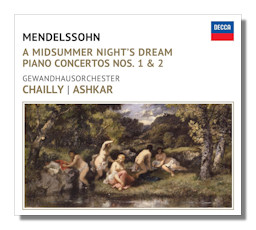
The Internet's Premier Classical Music Source
Related Links
- Mendelssohn Reviews
- Latest Reviews
- More Reviews
-
By Composer
-
Collections
DVD & Blu-ray
Books
Concert Reviews
Articles/Interviews
Software
Audio
Search Amazon
Recommended Links
Site News
 CD Review
CD Review
Felix Mendelssohn

- Overture "Ruy Blas" (ed. Hogwood)
- Incidental Music for "A Midsummer Night's Dream"
- Piano Concerto #1 *
- Piano Concerto #2*
* Saleem Ashkar, piano
Gewandhaus Orchestra/Riccardo Chailly
Decca Classics 4810778 75:15
This disc is entirely worth your purchase, and if that's all you need to know, by all means indulge. But if you are reading on, I have some observations to make. There are two kinds of recordings that matter in classical music; those that are brand new, and those that are really old. Those caught in the middle get attention too, but usually end up on budget reissues and in box sets. I make this cynical observation because this disc directly competes with the labels' own marvelous recording of the concertos with Jean-Yves Thibaudet and Herbert Blomstedt, with this very orchestra in tow. That particular disc received high praise from all corners of the musical globe, but Blomstedt has never been favored by Universal's marketing department, and this new package will likely supplant it.
That isn't to say it isn't excellent, for 75 minutes of prime Mendelssohn is always a worthy endeavor. But who is this album aimed at? Chailly's fans, who want to see him conducting the composers' major works instead of the rarities? How about Ashkar's, for this is indeed his first major release? Or of course, we have the dubious connection between this orchestra and the composer, which is now over 150 years old and cannot really mean much anymore. I just don't know why this is here; Decca has a proud tradition of exceptional Mendelssohn recordings, and aside from being another, and unusually shiny, the justification is minimal.
Howvee, the artistic contributions are simply top-notch. Christopher Hogwood's new critical edition of Ruy Blas receives its first recording here, and maybe its last. Chailly excels at rare, new, and unusual scorings, but there's not a whole lot that sounds new to me. The Gewandhaus Orchestra plays magnificently, though. In the Incidental Music, I have rarely heard the music sound so fresh. The Overture is both classically poised and tremendously exciting. The woodwind playing in the Scherzo is beyond reproach, and the strings agility is breathtaking. Chailly finds and ideal balance between simply letting the music speak for itself, and highlighting details in the score even at high speeds. In the Intermezzo, Chailly scores over Charles Dutoit's needlessly stop-and-go Montreal version, also on Decca. Everything is naturally phrased, and lovingly played. The same can be said for the following Notturno, which allows the brass to show off their warmer qualities. It's moving, and quite effective. If you think you've heard the Wedding March one too many times – and you probably have – you'll find Chailly and the Gewandhaus Orchestra to be your curative. It's flowing and features some fine brass fanfares. It also seems to move along faster than usual. This is a good thing.
In the Piano Concertos, I find Ashkar to be marginally less engaging than Jean-Yves Thibaudet. For one, the younger pianist plays less boldly, highlighting the more poetic qualities of the music but also reducing its dramatic tension. For another, he's more apt to rush slower sections – especially in the outer movements – and it does not make improvements. Chailly and his charges also play in a more reserved manner than did Blomstedt in the previous decade. The playing remains of the highest order, but it's ultimately less satisfying as a whole. The slow movements prove less mannered and flowing with Thibaudet. Both concertos sound fine, mind you, they simply don't match what the label already has. In the end, I'm impressed by the talent and musicality on display here, but wish for just a bit more. Still, at 75 minutes, this generous and well-recorded disc has considerable value.
Copyright © 2014, Brian Wigman




















